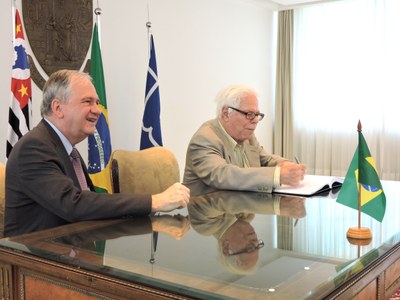USP's first chair to think art and culture
| Rouanet, the first holder of the Olavo Setubal Chair |
The 2012-2016 Direction of the IEA strove to lead the University of São Paulo to a new and deeper involvement with culture and the arts. The main result of this endeavor has been the Olavo Setubal Chair of Arts, Culture and Science, offered in 2015 but officially launched in 2016.
To give due weight and importance to this initiative, the first person to hold the chair is diplomat and essayist Sérgio Paulo Rouanet, former National Secretary of Culture and author of the cultural incentive law that bears his name.
A project of the IEA in partnership with Itaú Cultural Institute, the Olavo Setubal Chair will be a space to discuss and promote activities related to the world of arts, with special focus on cultural management. Its goal is to foster interdisciplinary reflections on academic, artistic, cultural and social issues of regional and global scope.
The official launch took place on February 17 at a meeting in the President's Office building, with the participation of the first holder of the Chair, Sérgio Paulo Rouanet, the director of the Itaú Cultural Institute, Eduardo Saron Nunes, the President of USP, Marco Antonio Zago, Vice-President Vahan Agopyan, the Director of the IEA, Martin Grossmann, and other representatives of the University and the cultural institution.
 |
|---|
| President Marco Antonio Zago (left) hosting diplomat Sérgio Paulo Rouanet for the official launch of the Chair |
"We are honored to have Sérgio Paulo Rouanet inaugurating the Olavo Setubal Chair. The support of Itaú represents the strengthening of the University's relations with the productive sector, which is very important by allowing the USP to benefit from the presence of personalities as the ambassador," said Zago.
After the meeting, part of the group visited the Itaú Cultural. According to Marcos Cuzziol, manager of the Innovation Center / Observatory of the institution, the partnership recognizes the special attention of Itaú Cultural towards management and formation of a cultural policy, integrating the 10 years of the Itaú Cultural Observatory, to be celebrated this year.
The Itaú Cultural Observatory was created in 2006 with a focus on management, economics and cultural policies. Since then, it promotes studies and discussion of these issues, stimulating reflection on culture in its various aspects and analyzing national indicators. Its performance and range are extended with seminars, meetings and lectures; an editorial line of books and the journal Revista Observatório, available for free on the web; and the promotion of research on the cultural field. In addition, since 2009, it holds a free course on cultural management in partnership with the UNESCO Chair on Cultural Policies, with the cooperation of the University of Girona and the support of the Organization of Ibero-American States (OEI). The course has one year of duration and takes place in classrooms and through virtual classes.
The chair
With a minimum duration of five years, the chair comprises two programs: Global Networks of Young Researchers, and Leaders in Art, Culture and Science, with a forecast joint endowment of R$ 1.5 million, sponsored by the Itaú Cultural Institute. Each program (described below) will be allocated R$ 150,000 annually.
Even before the official inauguration of the Chair, part of its activities had already begun. The Intercontinental Academia, the São Paulo stage of which was launched in April 2015, is part of the Global Network of Young Researchers program, aimed at developing new leaders. The programs seek to encourage and promote the interdisciplinary research of young (under 40) scholars.
The Leaders in Art, Culture and Science program follows the template adopted by USP’s José Bonifácio Chair, inaugurated in 2013. Each year, the chair is held by an exponent from the world of art, culture, politics, society, economics or academia – Rouanet being the first among them. In addition to the chairperson, professors, researchers and national and international personalities participate in the activities, with special attention given to public policies for culture and the arts.
"I hope to follow the example of Nélida Piñon, my colleague at the Brazilian Academy of Letters and holder of the José Bonifacio Chair [in 2015], and to help developing this new chair by placing a stone in this new building," said Rouanet.
The Olavo Setubal Chair extends the central role of the IEA in creating and managing professorships within the University. Over the course of its almost 30 years, the Institute lays claim to 11 chairs (eight elapsed and two active).
| Olavo Setubal, a culture supportive |
Olavo Setúbal
A renowned businessman, mayor of São Paulo (1975-1979) and foreign minister (1985-1986), Olavo Setubal left his mark on Brazilian culture by creating an important collection of more than 3,600 works of art. He conceived and founded the Itaú Cultural Institute in 1987. Among his many contributions to culture are the conception and construction of the São Paulo Cultural Center and of the Itaú Cultural Encyclopedia of Visual Arts, a computerized database of Brazilian art, with scanned reproductions of works dating from the 19th century French mission during the Empire.
Sérgio Paulo Rouanet
A national secretary of culture (1991-1992) and career diplomat, Rouanet was Brazil’s ambassador to Denmark and to the Czech Republic. He is the eighth holder of Chair 13 of the Brazilian Academy of Letters, elected on April 23, 1992. He was a visiting professor in the Graduate School of Sociology at the University of Brasilia (UnB), professor of the Rio Branco Institute and visiting professor at the University of Oxford, UK.
He graduated in Social and Legal Sciences from the Pontifical Catholic University of Rio de Janeiro, earning postgraduate degrees in Economics from George Washington University, in Political Sciences from Georgetown University and in Philosophy from the New York School for Social Research. He also holds a doctorate in Political Science from the University of São Paulo.
With information from the USP's press office
Photo: Erika Yamamoto
